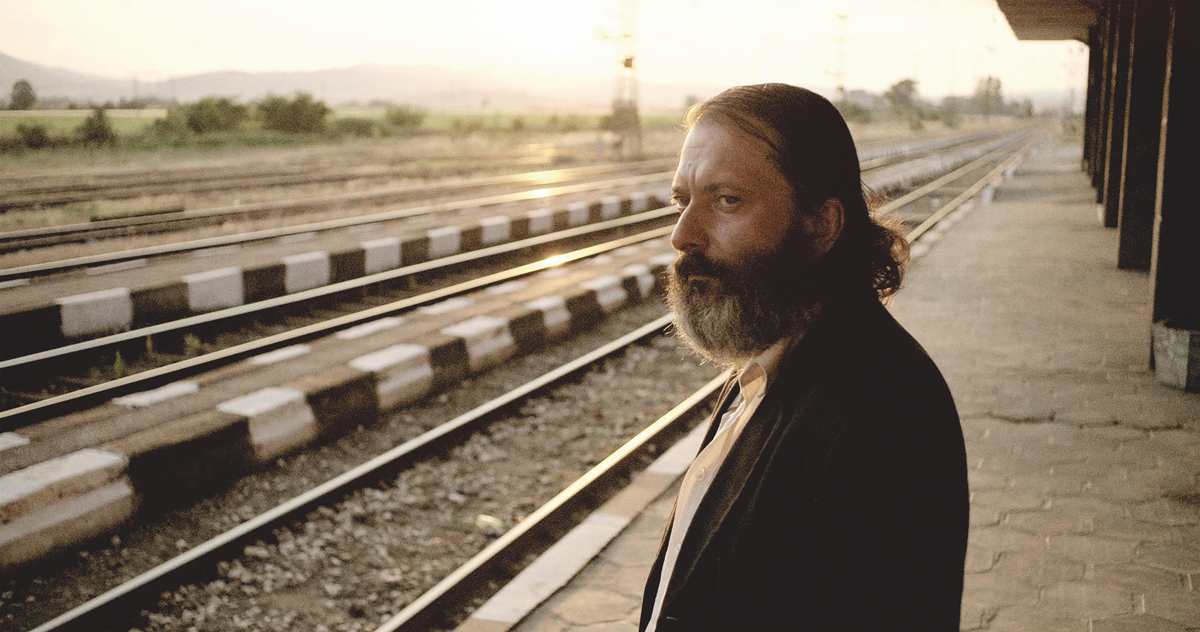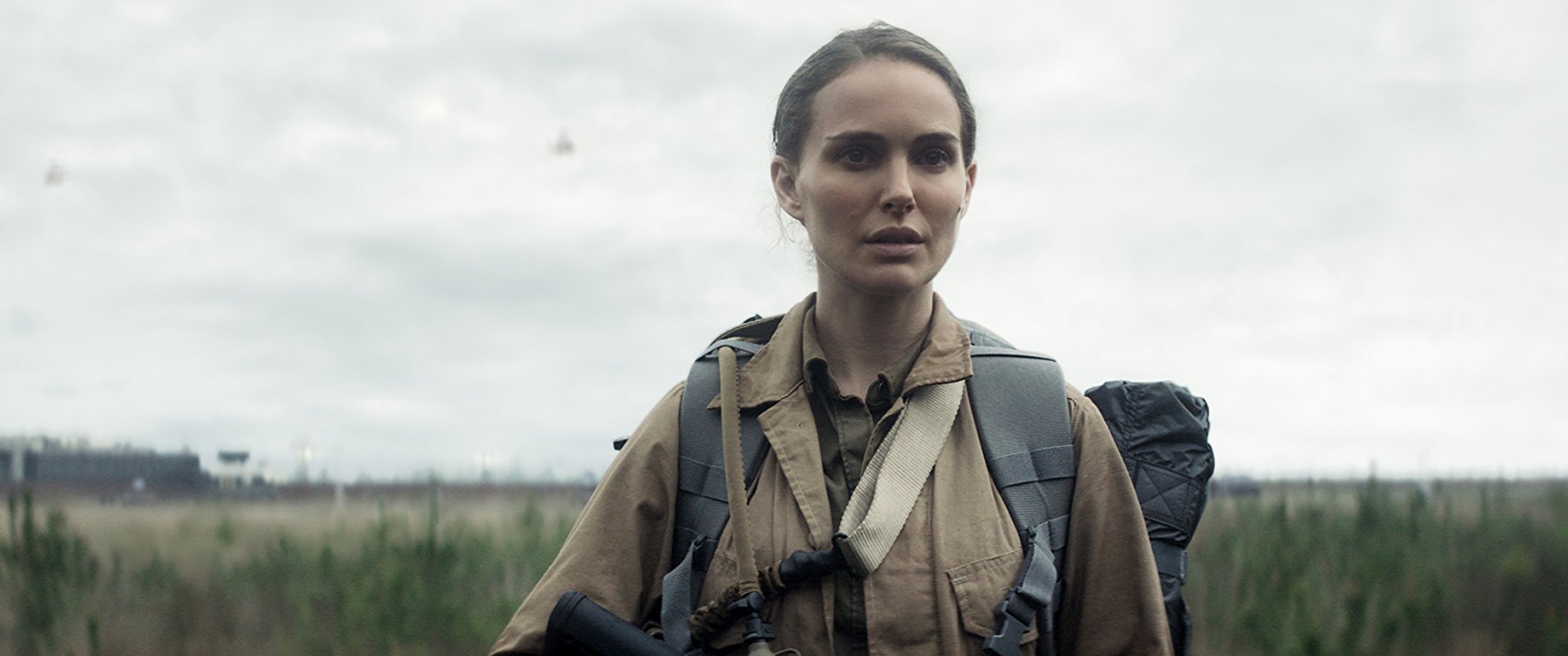Black Mirror Season 4, Episode 2 Review: ‘Arkangel’
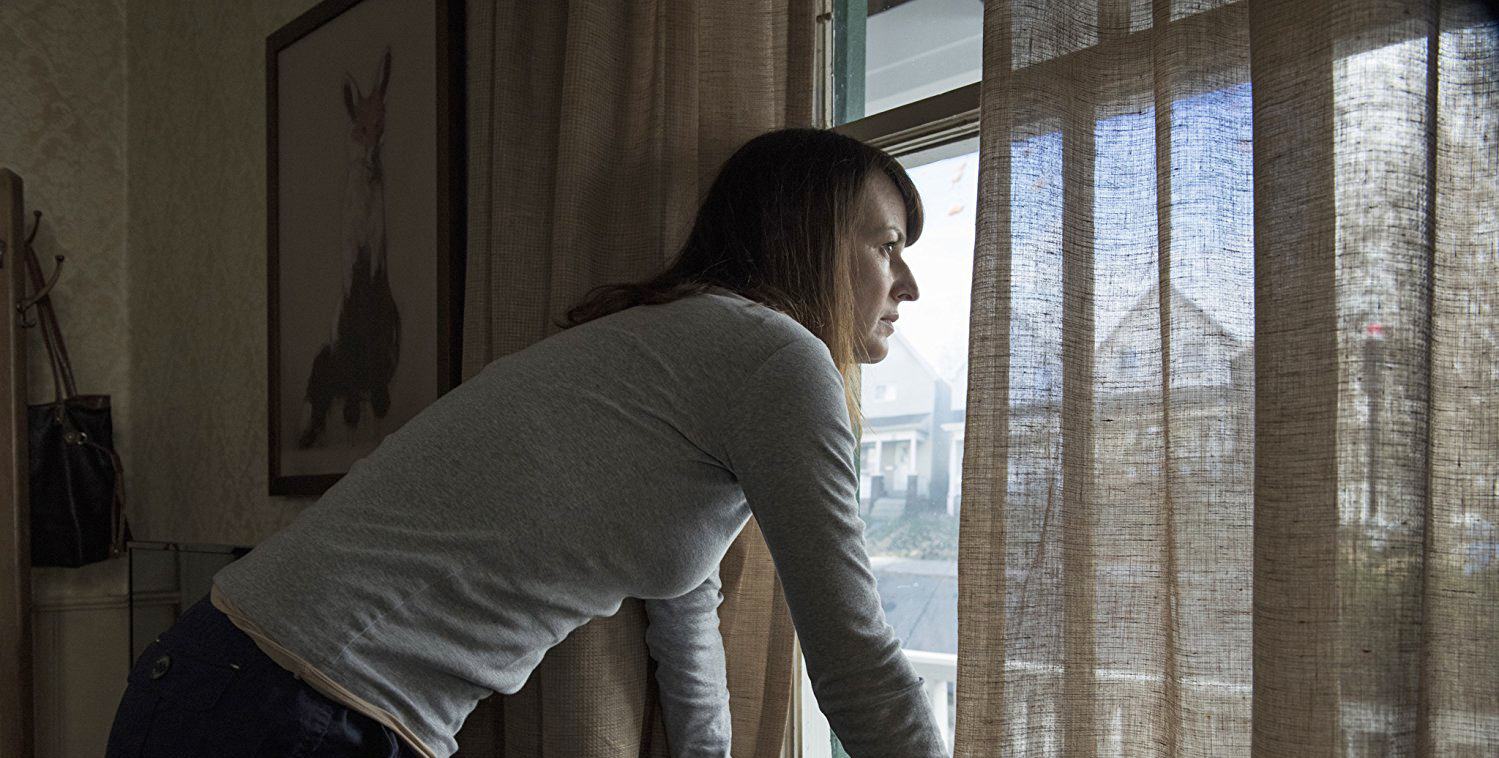
Where once anthology shows were a novelty, now, they’re everywhere. Black Mirror and Electric Dreams have continued the sci-fi legacy of The Twilight Zone. There are zany anthologies like Room 104 in which any genre is possible. There are horror anthologies like the aptly named American Horror Story, and crime anthologies – you can probably guess where this is going – like American Crime and American Crime Story, which are two completely different shows. And following on from the classic Coen Brothers movie, there’s Fargo, the show, which Noah Hawley has somehow managed to bend to present three distinctively separate seasons riffing on what would appear to be an incredibly restrictive niche.
Despite this expansive range of genres, ideas and settings that are now covered by the anthology umbrella, the term itself remains static, singular. There are genre prefixes, sure, as shown above. But there’s yet to be a distinction made apparent in terms of format, and that, in a rather roundabout way, is what I’m particularly interested in here. They might all, broadly, be anthologies, but there is a significant difference between Black Mirror, and, say, Fargo and True Detective. Both flit between parallel narratives, but while the latter two devote entire seasons to a single plot, Black Mirror and its ilk have already moved on by the next episode. Going by the catalogue of the show to this point, it’s a format that works, and the idea of a season given over to exploring, say, ‘The Waldo Moment’ is both comically unfavourable, and more generally unsustainable.
Black Mirror episodes tend to work because it goes all-in; nothing’s held back for ‘next time’ because there isn’t a next time. There’s been talk – and continues to be, at time of writing – of sequels to episodes like ‘White Bear’ at some point, and perhaps as the show ploughs on and ideas start to run dry, it’ll become more of a possibility. But even if sequels were to arrive, they would still be unlikely to hinge entirely on their predecessors; they’re more likely to follow on from existing concepts, rather than existing stories, and that’s already the case with many of the nominally unrelated episodes now.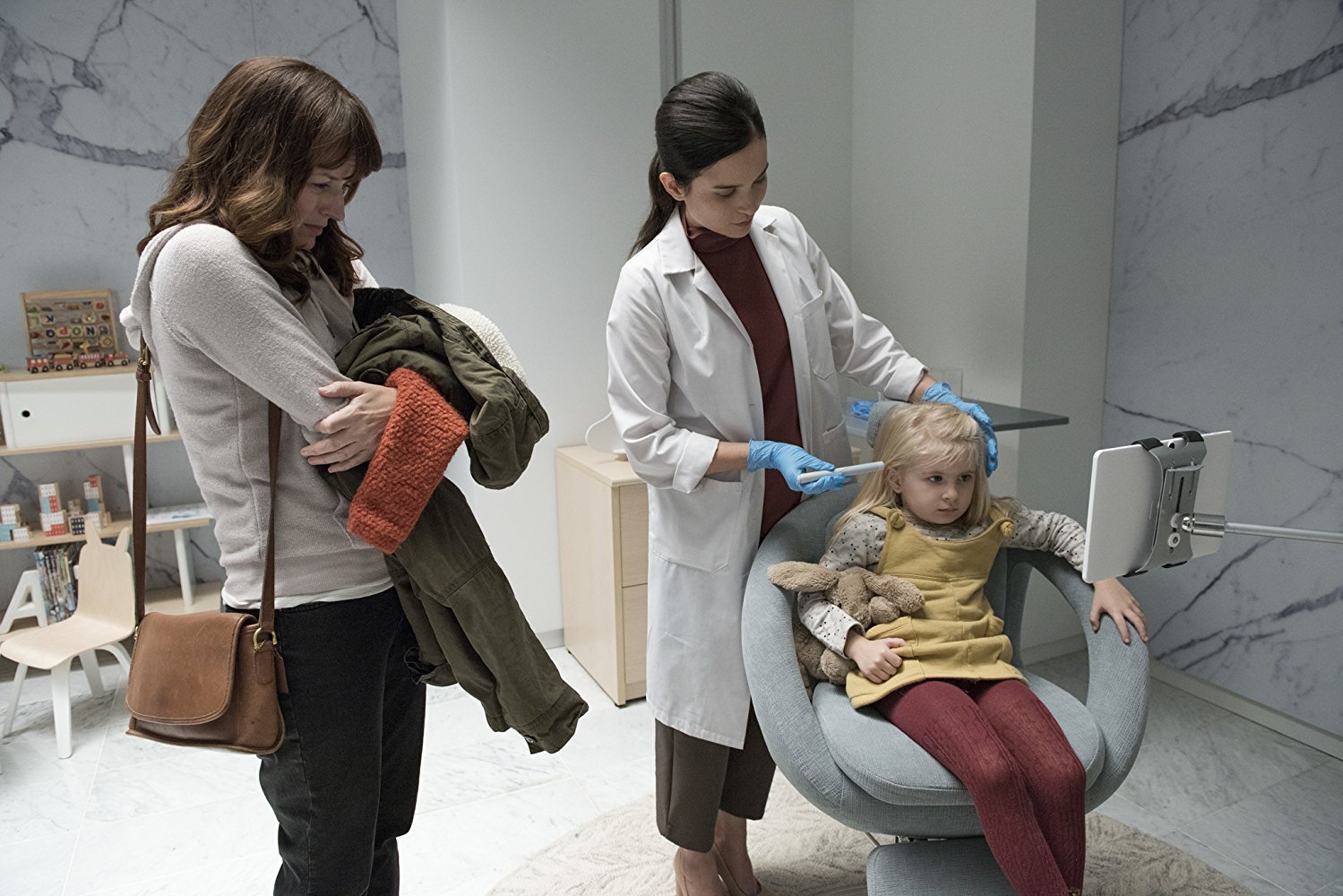 Yet while the format results in utterly brilliant dramatic material, and the alternative idea of expansion is unfathomable, there are rare occasions when it feels like more might be beneficial. ‘Arkangel’ is one such case. The episode – written as usual by Brooker, but more notably directed by Jodie Foster – covers a decade or so of the life of a mother and daughter, as impacted by the presence of a technological extension of parenting, the eponymous Arkangel. After Sara goes missing at the park – a red herring of a plot device that ends up just being the trigger for the introduction of Arkangel, rather than significant unto itself – her mother, Marie (Rosemarie DeWitt), takes action. Through an eerily quick, painless, and non-intrusive procedure, Marie gains access to Sara’s vital signs and location, and, most significantly, to Sara’s vision. Not only can Marie watch life through Sara’s eyes on a thinly disguised iPad, but she can also apply parental guidance filters to Sara’s sight.
Yet while the format results in utterly brilliant dramatic material, and the alternative idea of expansion is unfathomable, there are rare occasions when it feels like more might be beneficial. ‘Arkangel’ is one such case. The episode – written as usual by Brooker, but more notably directed by Jodie Foster – covers a decade or so of the life of a mother and daughter, as impacted by the presence of a technological extension of parenting, the eponymous Arkangel. After Sara goes missing at the park – a red herring of a plot device that ends up just being the trigger for the introduction of Arkangel, rather than significant unto itself – her mother, Marie (Rosemarie DeWitt), takes action. Through an eerily quick, painless, and non-intrusive procedure, Marie gains access to Sara’s vital signs and location, and, most significantly, to Sara’s vision. Not only can Marie watch life through Sara’s eyes on a thinly disguised iPad, but she can also apply parental guidance filters to Sara’s sight.
And so we watch as Sara grows up under Arkangel. Technically, Sara is seen at three ages, and three stages of childhood: age 3, when she first ‘gets’ Arkangel-ed, age 9, when it starts to leave a mark, and age 15, where the majority of the story takes place. 12-odd years of life in 50 minutes is a hard sell, and in allowing time for the necessary scenes to play out fully – rather than being butchered via an editing hack job – it so follows that the ‘unnecessary scenes’ are largely absent, leaving an episode that’s incredibly precise. Perhaps too precise. It’s here that that the format of Black Mirror can be, if not questioned, then at least considered. There’s no talk here of a sequel; the ending we get is both the ending that was always coming, and the ending that fits best. But without the safety net of an extended overall run-time, the sprawling bildungsroman loses a bit of its vigour. If ‘USS Callister’ could be 75 minutes long, what was stopping ‘Arkangel’ being 10, 15, 20 minutes longer and coming close to matching it?
As it is, we see exactly the impact Arkangel has on Sara’s life, and on her relationship with her mother, or more accurately, Marie’s relationship with Sara. We don’t see what it’s like actually growing up under Big Mother, rather than Big Brother, so much as we see precisely the narrative that springs from Arkangel. When the hits start coming towards the end of the episode – Marie’s return to Arkangel, the subsequent crumbling of Sara’s relationship with her boyfriend, and the inevitable confrontation between mother and daughter – they’re reliably strong. But they’re also slightly shallow. This kind of linearly narrow focus isn’t at all exclusive for Black Mirror and it’s high concept, single episode structure. But it is fairly unusual for an episode to cover quite such a lengthy period of time in such a grounded way. ‘San Junipero’ potentially covers a huge timeline, but regardless of when the first encounter between Yorkie and Kelly takes place in ‘real time’, it’s always grounded through the timeless medium of simulated reality. ‘Be Right Back’ also spans years, but its jump is more of an epilogue than anything else. And ‘White Christmas’ could be seen as covering thousands of years or a few, depending on how pedantic you want to be.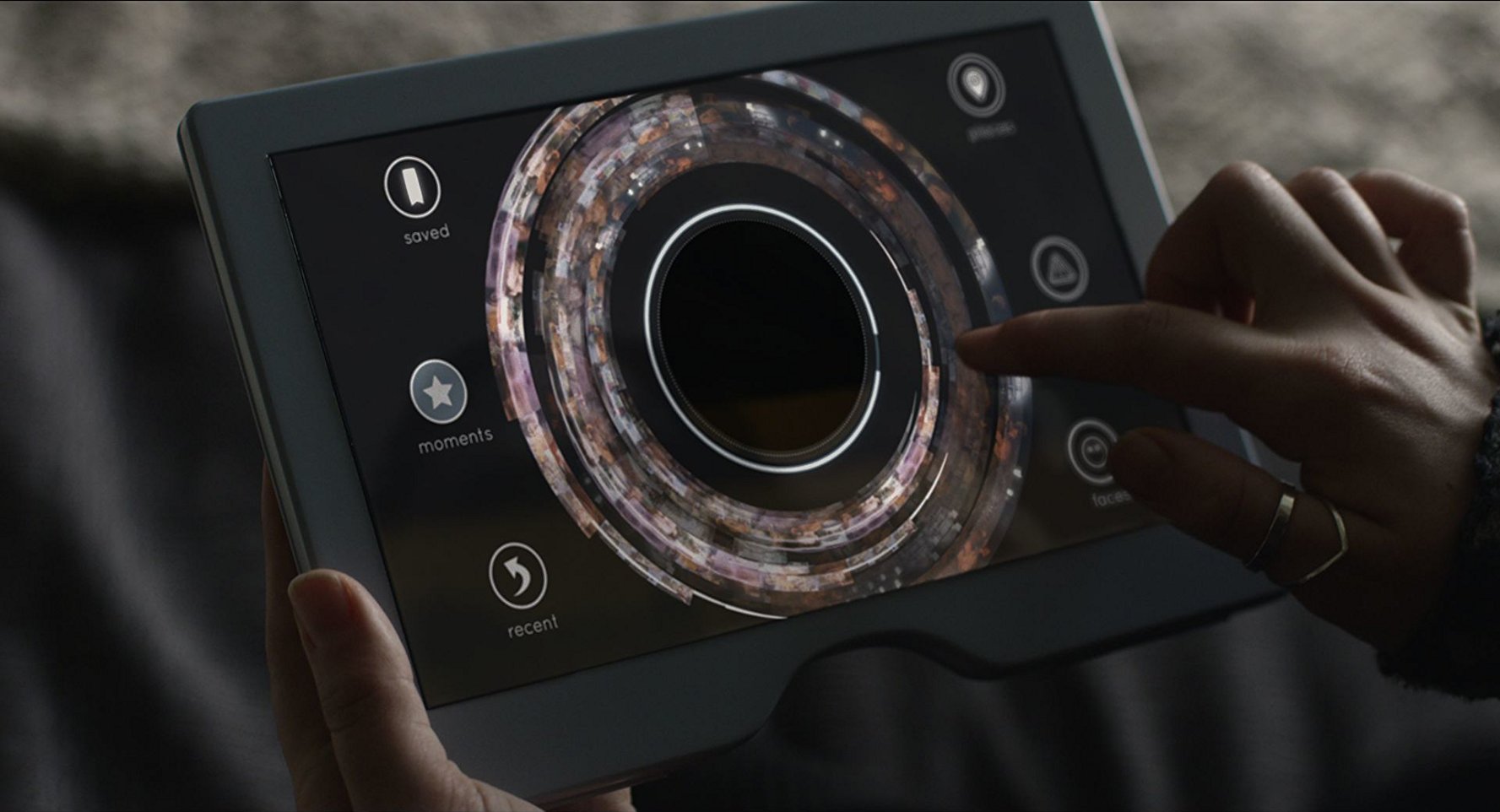 Here, whole years go by in the blink of an eye, as Sara walks back and forth to school, passing the same tethered dog, which ends up being a kind of litmus test as to the current status of her Arkangel development. By the end of the montage, age 15, she’s gone from the dog being filtered out, to happily patting and feeding it. The purpose, of course, is to literally show the passage of time as a plot point in its own right. Enough time needs to have passed so that Marie either forgets about Arkangel, or at least has moved away from her reliance on it. But due to the speed at which this all occurs, it’s still firmly at the forefront of the viewers mind, even as it appears to have left Marie’s. Perhaps this too is the point, driving a wedge between us and them, just as technology eventually drives a wedge between Marie and Sara. But a couple of extra scenes here and there would not only have expanded the character profiles of Sara and Marie, but would have also reinforced those other scenes more closely tied to Arkangel.
Here, whole years go by in the blink of an eye, as Sara walks back and forth to school, passing the same tethered dog, which ends up being a kind of litmus test as to the current status of her Arkangel development. By the end of the montage, age 15, she’s gone from the dog being filtered out, to happily patting and feeding it. The purpose, of course, is to literally show the passage of time as a plot point in its own right. Enough time needs to have passed so that Marie either forgets about Arkangel, or at least has moved away from her reliance on it. But due to the speed at which this all occurs, it’s still firmly at the forefront of the viewers mind, even as it appears to have left Marie’s. Perhaps this too is the point, driving a wedge between us and them, just as technology eventually drives a wedge between Marie and Sara. But a couple of extra scenes here and there would not only have expanded the character profiles of Sara and Marie, but would have also reinforced those other scenes more closely tied to Arkangel.
Sara’s immediate lifestyle under the system’s watchful eye is unsurprisingly dramatic; she is blocked by the filtered viewing from seeing blood, danger or anything possibly stressful – including, most disturbingly, the apparent heart attack of her grandfather. A classmate – a younger version of the aforementioned eventual boyfriend – tries to describe to her a gruesome scene of CCTV, so she goes home and draws it. The fake, pencilled blood she draws is filtered out, so she pricks her finger with a pencil to draw her blood in a different sense, except that too is filtered, so she then attacks her mother with the pencil. None of which seems remotely out of the ordinary for a child whose entire field of view is carefully sanitised, whose relationship with trauma, personal or general, is totally non-existent at that point. Yet after the visit to a psychiatrist that follows, and the subsequent scaling back of Arkangel, including the filter being turned off, Sara’s life settles into the improbably ‘normal’ monotony of the school walking montage. She simply ‘grows up’ like any kid, rather than like a kid whose mother still needed to learn to let her grow up, and like a kid who needed to learn how to. We’re meant to assume those two conditions were met off-screen, but it’s the kind of material that would have fleshed out the relationship effectively had they been shown in some form.
Outside of the question of focus – and despite my misgivings, it is still just a question, as the linearity has good and bad outcomes – there is a wealth of rich material here. Conceptually, ‘Arkangel’ – and its predictably radical impact on basic personal interaction – is fairly similar to ‘The Entire History of You’. Both are relatively familiar worlds, in which a central technology that allows the access and reviewing of one’s visual stream exists is the only significant development beyond ‘our’ world. But what sets Arkangel apart is the idea that this is failed technology. Arkangel only ever reaches that trial stage that Sara is a part of. Either by that point, or soon after, it’s banned in Europe, and it’s not long after that the US follows suit. The snazzy, lab-coat dream of Arkangel is at its peak when we see it. Thus, the narrative of ‘Arkangel’ is, for once, not the carefully manufactured operation of a surveillance state where all children, and thus eventually, all citizens, are monitored and regulated, or even more broadly a story about the technologies ubiquity, but instead the complete opposite. The technology is not hamstrung by authoritarian governmental oversight and intervention, but by a spiralling sense of libertarian pseudo-privacy. Not privacy in the default sense, but in the very American strain of being able to conduct one’s personal business as they see fit without the government knowing or caring. Arkangel is wound down, but the implant is irremovable, and thus its impact lingers long after. Either the world doesn’t know people still use Arkangel, or they know but just don’t care; regardless, this feeling of a broken America subtly runs through the episode, from the empty, barren neighbourhood – more fences than people visible – to the muted colour palette.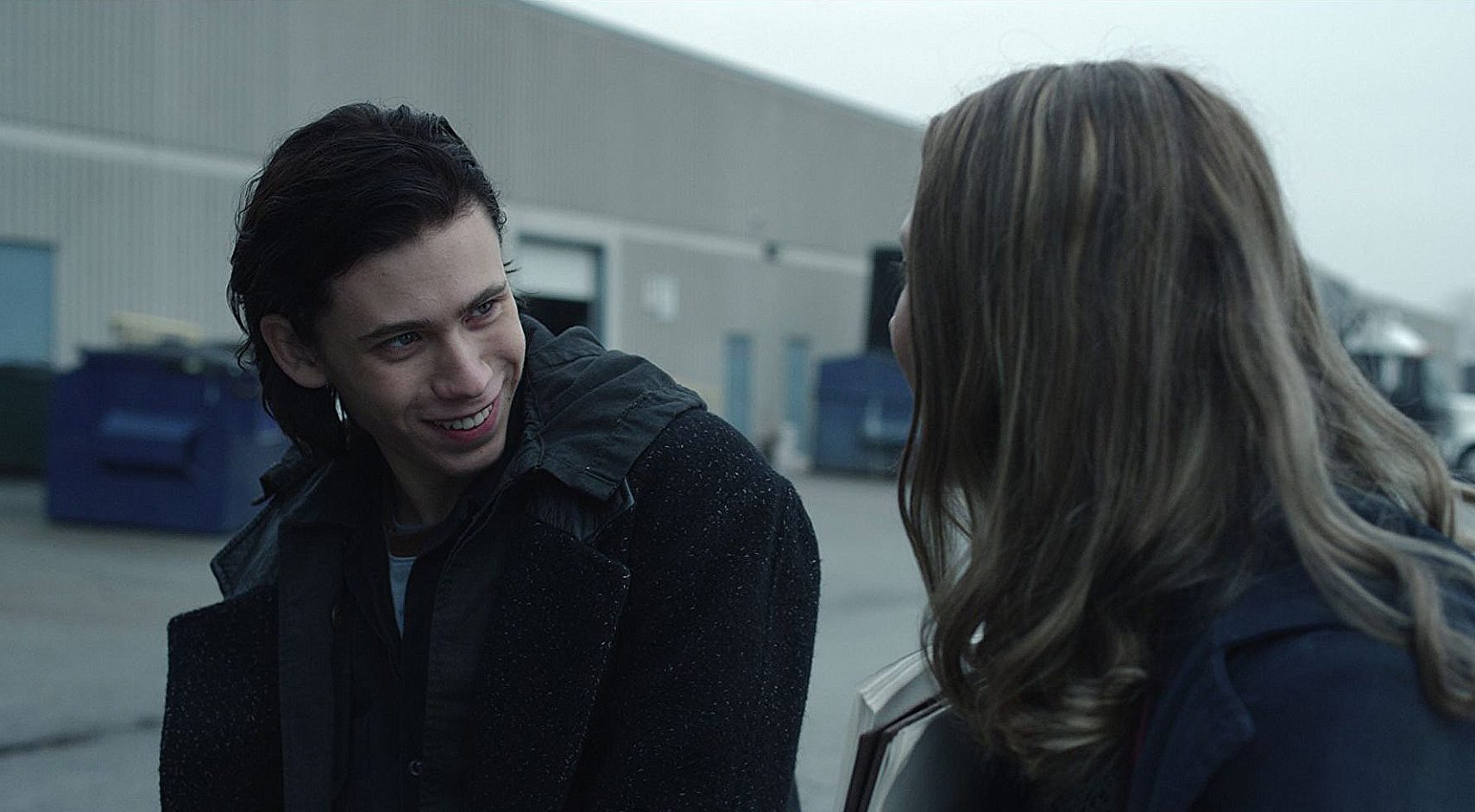 This isn’t the America of now, once it’s boiled over into protest, reactionary self-inflicted political suffering and terminal trepidation. Rather, it’s the America of just before, where the damning impact of the technology is almost a dirty secret, and no-one seems to be going anywhere, much. Marie goes on an albeit fruitful date with her patient; we never see that go any further. Sara’s plans for the future before she runs off are undefined, and after, who can say other than that she’s unplugged the technological cord between her and her mother, 15 years after the umbilical cord of birth was severed. Everyone seems trapped in small-town Americana of Springsteen-esque parties by bodies of water – here a lake, rather than a river as in the classic song ‘The River’ – and a network of relationships that don’t extend outside city-lines. The technology of Arkangel wouldn’t change that, even if it was universal within this world; it would just change how these relationships function.
This isn’t the America of now, once it’s boiled over into protest, reactionary self-inflicted political suffering and terminal trepidation. Rather, it’s the America of just before, where the damning impact of the technology is almost a dirty secret, and no-one seems to be going anywhere, much. Marie goes on an albeit fruitful date with her patient; we never see that go any further. Sara’s plans for the future before she runs off are undefined, and after, who can say other than that she’s unplugged the technological cord between her and her mother, 15 years after the umbilical cord of birth was severed. Everyone seems trapped in small-town Americana of Springsteen-esque parties by bodies of water – here a lake, rather than a river as in the classic song ‘The River’ – and a network of relationships that don’t extend outside city-lines. The technology of Arkangel wouldn’t change that, even if it was universal within this world; it would just change how these relationships function.
Perhaps part of this is that the capacities of Arkangel have been unrealistically covered already; Marie uses it to track Sara’s whereabouts when she lies and goes down to the lake, after ringing around other parents to no avail, but Arkangel is just taking powers that were previously part of a parental sixth sense in teen dramas and American fiction, and actually making them a concrete thing.
Jodie Foster’s direction is a highlight of the piece. The monotony of repetition within Marie and Sara’s lives – the smoothies, the walks to school – is only so narratively. Visually, there’s something in each that feels alive, adding intrigue to an episode that’s otherwise largely absent of it.
‘Arkangel’ isn’t objectively bad, by general standards or by those of Black Mirror. But as has been said elsewhere of it – in The Telegraph – it’s “archetypal Black Mirror, almost to a fault.” That’s the sum of my view too; it’s not that the execution falls flat, but rather that it comes close enough to doing so that it becomes notable. It’s typical Black Mirror in one sense, but in another, it’s a rare example of the show not going far enough.
★★★★

